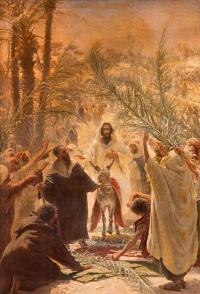
The reading from the gospel of Mark begins with the anointing of Jesus by the sinful woman. It is a poignant introduction to the events unfolding in Jerusalem. Jesus speaks about his body being prepared for burial. There is also the irony that the sinner is the one who humbly pays homage to the Lord, while the rest of the guests hypocritically talk about the waste of money. It is this incident, also, that seems to spur Judas into betraying Jesus.
In the liturgy on Palm Sunday we read two very different stories. The first gospel, read at the time of the procession, tells of Jesus’ entry into Jerusalem as its king, when the crowds greeted him rapturously. The second tells of how he was handed over to the Romans by his own people to be scourged, mocked and crucified. His crown was made of thorns and his throne was a cross.
When tempted by Satan in the wilderness, Jesus had rejected the promises of earthly glory. It was now that the emptiness of worldly triumphs became apparent compared to the lasting victory of the cross. Perhaps Mark wanted to sow the seeds of hope in his account of what seemed an outright failure. His mention of Alexander and Rufus, sons of the foreigner who helped Jesus carry his cross, might suggest new beginnings. They were obviously part of the early Christian community and would have been valuable witnesses of the crucifixion, at least through their father Simon of Cyrene. The Roman centurion’s declaration at Jesus’ death might also point to new pathways for the future. The power that executed him would also be the means of his word spreading to the gentile world.
